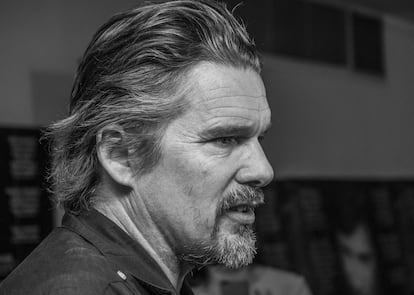Ethan Hawke: ‘Actors’ lives are aired out in the press, but there are few novels that talk about them’
The divorce of two stars and a stage production of Shakespeare on Broadway are the focus of ‘A Bright Ray of Darkness,’ a novel written by the actor and director

In 2003, when the marriage of the actor Ethan Hawke and the star Uma Thurman, mother of his two children, was falling apart, he came to the Broadway stage to be part of a production of Shakespeare’s Henry IV, in which he played the role of the warrior Hotspur. The 20 years that have since elapsed are the same ones in which the actor from Reality Bites, the Before Sunrise trilogy, Gattaca and Boyhood wrote A Bright Ray of Darkness, a novel published in 2021 by Knopf in the United States to critical acclaim, and whose Spanish translation has just been published by Berenice.
Marital problems with a famous spouse, aired out in the press, and a Broadway production of the same Shakespearean play are just two of several biographical winks that Hawke shares with his book’s protagonist. William Harding is an actor in the middle of a personal crisis who has just passed his thirties, whose parents separated when he was very young, who grew up with his young mother and who rose to fame in his adolescence thanks to the movies. “My life is the clay with which I have tried to shape a story that makes sense and is not a waste of readers’ time; that serves to construct a fiction that will engage them and allow them to feel that they are accessing something important and secret, that reflects something about themselves as well. The danger in using one’s own life is that it turns the situation into a therapist’s couch,” he explained via telephone on Tuesday.
A Bright Ray of Darkness is Hawke’s third book of fiction — in other genres, he has written the graphic novel Indeh: A Story of the Apache Wars (Grand Central Publishing, 2016), and the historical fiction Rules For a Knight (Alfred A. Knopf, 2015), as well as screenplays — and the first in which he narrates, with both rhythm and humor, the inner workings of an actor. Structured as a play (it has a prologue and five acts, with several scenes apiece), in the novel the ins and outs of actors’ lives — their anxieties, insecurities, egos, miseries and greatness amid the strange collective energy that is activated behind the curtains — run parallel to Harding’s descent into hell. Staying in a nondescript Chelsea hotel, he tries to stay afloat with varying degrees of success while fighting back the panic of life and stage. Breath is one of his obsessions, the key to his being able to deliver a good show. “Many of the rules key to acting are also key to living well, like breathing and being in the here and now. I believe that the acting profession has allowed me to grow as a person,” he says, adding that this helps him to explain to himself why he has remained in the world of showbiz after so many years.

“When I published my second novel, during a dinner in Germany my editor asked me why I ran from the subject of acting in my books. He told me that this is what I know and I should think about writing about it,” he remembers. “Actors’ lives are aired out in the press, but there are very few novels of substance that talk about it that aren’t autobiographical books in first person. There’s a book by James Baldwin and a few other things, but I saw that there was an opportunity.” And it was this theme, he explains, that led him to structure the book the way he did: “I wanted to write about actors’ lives, and the only way to create the frame in which I could do it was through the production of a play, from dress rehearsals, the double-header days, the school performances, opening night. That was there from the beginning.” And Henry IV? “I thought about King Lear, but I went for the other play because I know it deeply, and it talks about masculinity, the father-son relationship.” Hawke is no stranger to these subjects, and has touched on them in many of his films, like those he made with Richard Linklater. “These are the issues to which I’ve devoted a lot of my work, but the interesting thing about books is that I do it on my own. There’s incredible pleasure in collaborating and making something as a team, but in literature you produce something much more intimate,” he says.
Harding, his hero, falls into drugs, alcohol and sex. “It’s so hard to show sex in film because it immediately becomes pornographic, but literature is a great place to try to do it. The protagonist is falling through the circles of hell, he’s losing his self-esteem and putting into question the nature of masculinity.” Did #MeToo have any influence on the book? “I think that it probably has changed how people read it. 20 years ago it would have happened differently. I’ve wanted to write about what makes a good or bad guy and I asked myself how one would narrate the history of a bad one.” Has he saved his diaries? “Yes, I have a diary I’ve kept for almost 40 years,” he says. Nowadays, he says he feels like “an old actor, but a young writer, with the same sensation of vulnerability as a beginner.”
Fame is another one of the subjects on which the book touches from its opening scene, in which a taxi driver picks up the protagonist from the airport and begins to lecture him on his life, based on knowledge of the actor’s personal situation that he’s read in tabloids. Can a person go from loathing fame to panicking about being forgotten? “When I was younger, I was more embarrassed about what other people might think about me, but as you get older, you realize that the interest in you doesn’t even last that long, and now I take it with more of a sense of humor,” he says. Has that allowed him to lose the fear of exposing himself, not just on stage, but also on the page? “I think that if Melville was able to write a passionate movie about whale hunters, you could write something interesting about actors. The strange thing about fame is that you never make a first impression; when you’re introduced or run into someone, that person already has their idea or opinion about you. If you don’t want to live in isolation and like to mingle, you get this weird dynamic in which you can end up treating the actor-you as if they were another person, and talking about yourself in third person. That’s how you go crazy,” he says, cackling. Is he interested in the lives of other actors? “Before, I would have said no, but after making the documentary about Paul Newman and Joanne Woodward, The Last Movie Stars, I guess so, the job interests me, the way each person has of telling stories, and how actors try to understand ourselves.”
The discussion around who has the right to play which role or write a book about or imagine the life of a person of a different race or sex has escalated in recent years. As an actor and writer, what do you think about it? “Probably, it’s due to the fact that the world needs some truth, and there is something exciting about authenticity. But you have to figure out what is authentic. I think the debate is important, but, as Emerson said, I feel like I was born on a staircase, and I don’t quite see what is coming.”
Sign up for our weekly newsletter to get more English-language news coverage from EL PAÍS USA Edition
Tu suscripción se está usando en otro dispositivo
¿Quieres añadir otro usuario a tu suscripción?
Si continúas leyendo en este dispositivo, no se podrá leer en el otro.
FlechaTu suscripción se está usando en otro dispositivo y solo puedes acceder a EL PAÍS desde un dispositivo a la vez.
Si quieres compartir tu cuenta, cambia tu suscripción a la modalidad Premium, así podrás añadir otro usuario. Cada uno accederá con su propia cuenta de email, lo que os permitirá personalizar vuestra experiencia en EL PAÍS.
¿Tienes una suscripción de empresa? Accede aquí para contratar más cuentas.
En el caso de no saber quién está usando tu cuenta, te recomendamos cambiar tu contraseña aquí.
Si decides continuar compartiendo tu cuenta, este mensaje se mostrará en tu dispositivo y en el de la otra persona que está usando tu cuenta de forma indefinida, afectando a tu experiencia de lectura. Puedes consultar aquí los términos y condiciones de la suscripción digital.









































